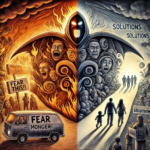Life is full of questions that challenge us to think deeply about our place in the universe. For many, including myself, the intersection of faith, science, and personal experience has been a profound area of exploration. Recently, I’ve been reflecting on this in a way that has reshaped how I view spirituality, religion, and human understanding.
The Calling of Faith
Like many others, my journey toward faith began with curiosity. A Lutheran church I’d passed countless times unexpectedly drew me in, almost as if it were calling out to me. When I stepped inside, I felt an immediate connection—a sense of belonging that I hadn’t anticipated. As I delved into the teachings of Martin Luther and the origins of Lutheranism, I found answers to some of the questions I’d long carried. Martin Luther’s rebellion against the corruption within the Church resonated deeply, offering a path that felt both authentic and grounded.
Wrestling with the Past
Part of this journey has involved confronting my past. I spent decades in the music industry, an environment that often felt dark and exploitative. Separately, I engaged in shamanistic practices, cultivating psychedelics like psilocybin and DMT and guiding others through their use. While these practices brought moments of clarity and insight, they also left me questioning whether such experiences were pathways to truth or dangerous shortcuts.
This tension—between seeking enlightenment through substances versus traditional spiritual practices—has been a key theme in my journey. Fasting, prayer, and meditation—practices found in countless cultures and religions—can lead to profound spiritual experiences. This raises a fundamental question: Why would God create these natural substances if not for us to use them? Were they meant to help us, test us, or tempt us away from the light?
Balancing Science and Faith
Growing up, I was fascinated by science. I stargazed on summer nights in rural Montana, marveling at the vastness of the universe. Yet, as I’ve aged, I’ve started leaning more into faith. Science explains much about the world, but there are questions it cannot answer: Why are we here? What is our purpose? Is there a divine plan?
I’ve found myself pondering the possibility that God places limits on human understanding for our benefit. Perhaps our inability to fully explore the cosmos is a safeguard, reminding us that some knowledge belongs only to the divine. This balance between faith and science feels less like a conflict and more like a complement—each offering insights the other cannot.
Universal Truths
Another profound question has been about the universality of God. Native Americans prayed to a Great Spirit, seeking guidance and connection. While they didn’t know of Christianity, isn’t it possible they were reaching out to the same God? This idea challenges the exclusivity often claimed by organized religions and emphasizes the importance of humility. Who are we to judge how others seek the divine?
At the same time, the life of Jesus Christ stands apart. His teachings, miracles, and sacrifice offer a path to salvation unlike any other. Could there have been other manifestations of divine truth in different parts of the world? It’s a question that reminds me of the infinite possibilities within God’s plan.
Moving Forward
As I explore Lutheranism, I’m also drawn to the balance it offers. It’s grounded in tradition yet open to questions and growth. Unlike more rigid or overly liberal denominations, it provides a space to wrestle with complex ideas while staying anchored in Scripture.
This journey has also made me cautious about ego. It’s easy to feel isolated in deep thought, but I’m reminded that many people grapple with these questions. Sharing experiences and engaging in conversations can bridge gaps and foster understanding.
A Letter to Pastor Dan
I’ve been inspired to share these reflections with my pastor, seeking guidance on how to frame them within a broader spiritual context. The letter will encapsulate everything from my experiences in the music industry to my shamanistic practices, from the tension between science and faith to my thoughts on the universality of God. It’s a way of offering my journey as a tool—not for recognition, but for connection.
Conclusion
This exploration of faith, science, and truth is ongoing. It’s a path filled with questions, but also moments of clarity. For anyone on a similar journey, I encourage you to remain open—to faith, to science, and to the possibility that the answers we seek may be found in unexpected places.


